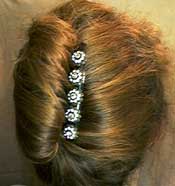This article relies largely or entirely on a single source .(July 2022) |

A French twist is a common "updo" hair styling technique. [1] It is created by gathering the hair in one hand and twisting the hair upwards until it turns in on itself against the head. It is then secured with barrettes, combs, hair sticks and/or hairpins. [2] It was popular from the late 1950s through the early 1970s.
Contents
French twists are usually worn to proms and weddings. [3] Hair clips are also commonly used with French twists.